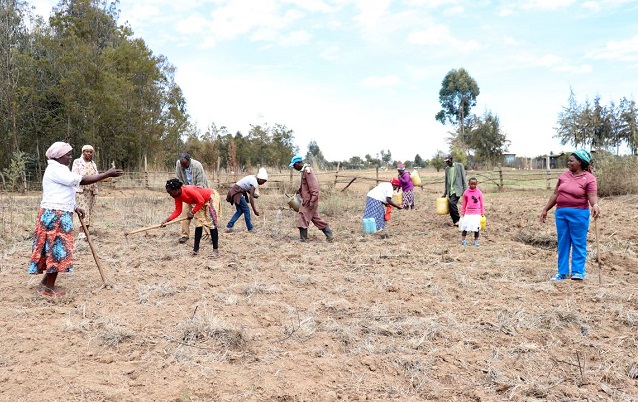Climate-smart agriculture and risk management in Laikipia and Nyandarua

This IKI Small Grants project addresses climate resilient water management and climate resilient agricultural practices. Thereby it supports smallholder farmers in adapting to the negative impacts of climate change and land degradation. It introduces climate-smart agriculture techniques with a focus on irrigation by installing water pans, dam liners, shade nets, and water pumps. The installations are accompanied by trainings for maintenance and repair of the pumps. Through trainings and innovation, farmers are guided for two years to use climate smart agriculture. Amongst other things, they receive trainings on climate change adaptation and mitigation, solar energy, disaster risk reduction, indigenous plants, and livestock breeds. The project further works with community driven initiatives such as village loaning and saving groups as well as community managed disaster and risk reduction groups, to enhance the resilience of livelihoods and ecosystems to climatic risk.
INITIAL SITUATION
Climate change is a major threat to the sustainable development in Kenya. Rural small-scale farmers normally bear the brunt of climate change that compound the existing challenges. Kenyan households heavily rely on rain-fed agriculture, which in turn leaves them vulnerable to extreme droughts exacerbated by climate change. Many households lack alternative sources of livelihood, hence diversification cannot be expected. Strong and well-coordinated community driven initiatives for disaster and risk reduction are lacking.
TARGET GROUP
The main target group are 750 smallholder farmers in Laikipia and Nyandarua Counties, who are affected by the adverse effects of climate change. The smallholder farmers are 60 per cent women, 40 per cent men, and 20 per cent youth. Selected beneficiaries participate in trainings on climate-smart agriculture, receive improved irrigation systems, and act as multipliers to reach all targeted households.
Additional 300 community members gain support from this project as climate change awareness is raised by public forums. 150 Government officers and 8 civil society organisations benefit from trainings on climate risk planning and management.
The participatory planning process of the project allows feedback loops from the beneficiaries by facilitating several community engagement meetings.
APPROACH AND ACTIVITIES
The IKI Small Grants project addresses water management and climate-smart agriculture for 750 smallholder farmers in Laikipia and Nyandarua Counties.
It provides dam liners and water shade nets, and supports the construction of water ponds. Solar water pumps and irrigation kits will be provided to smallholder farmers’ groups. The project further ensures its sustainability by providing maintenance trainings for the irrigation systems.
The project promotes climate-smart agriculture in principle. It advocates for and trains farmers to plant indigenous crops and the use specific livestock varieties. Sorghum, millet, and drought resistant maize are more resilient to climate change, which also applies to cattle breeds like the boran.
To address the societal conditions in the project region, the project also involves the political level. It strengthens the climate risk management planning of the county level and mainstreams climate change into sectoral development plans. It further supports community driven initiatives including village commercial centre groups, village loaning and saving groups and community managed disaster and risk reduction groups, to enhance the resilience of ecosystems to climatic risk.
LATEST PROJECT HIGHLIGHTS AND IMPACTS
- 3 water pans and 3 dam liners constructed
- 3 solar water pumps inside water pans installed
- Farm input, such as drought-resistant seeds distributed
- 783 farmers (480 women) trained on climate change and climate-smart agriculture
- 8 county Community Lead Disaster Risk Reduction (CLDRR) forums facilitated, reaching over 4000 community members
- National Tree planting day: 1305 indigenous trees planted
CAPACITY DEVELOPMENT
IKI Small Grants supports Hope Valley Family Institute in their organisational capacity development, offering advanced project management skills. Measures include an intensive training on newest trends in monitoring and evaluation and the establishment of a cloud-based-system like Enterprise Resource Planning for better program management.
ABOUT THE ORGANISATION
Hope Valley Family Institute (HVFI) is a Non-Governmental Organisation (NGO) that began community development work in 1999 as a self-help group and formally registered as NGO in 2001. HVFI works for good health and well-being of communities and empowers women, girls, youth, and children who are marginalized and vulnerable. Through interventions in health, education, economic empowerment, and livelihood improvement HVFI directly addresses the target communities. It has its headquarters in Nyahururu, a town located at the border between Nyandarua and Laikipia Counties.
